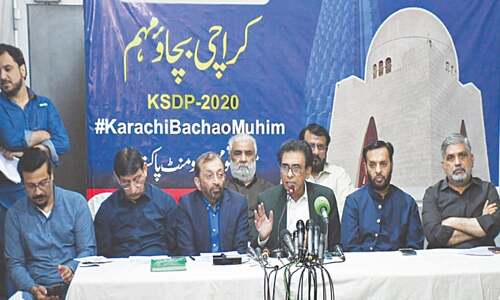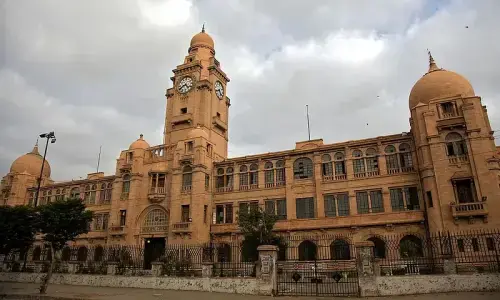KARACHI: The Irtiqa Institute of Social Sciences organised a lecture on ‘Covid-19 pandemic: a general view from international and national perspective’ by Dr Riaz Shaikh, dean of the Faculty of Social Sciences and Education at the Shaheed Zulfikar Ali Bhutto Institute of Science and Technology in which he discussed the current situation of the prevailing crisis of Covid-19 from its political, economic and social aspects that was streamed live on Facebook on Saturday.
Dr Shaikh stressed the importance of realising the crisis with a million affected and 300,000 casualties in 198 countries. “It is a global pandemic with chances of a second strike in a few months,” he said while criticising Minister for Planning, Development and Special Initiatives Asad Umar’s remarks of more people dying in accidents than of the virus. “It is very alarming. It also makes one wonder about the government’s seriousness in handling the pandemic,” he added.
Turning to history, he pointed out that after the emergence of the neo-liberal economy, things were not looking good. And after the break-up of the USSR, a unipolar world emerged where only the new political and economic order under the capitalist influence will be followed.
He mentioned the works of Francis Fukuyama, in particular End of History in which he talks about no more conflict and about a liberal world with a liberal democracy. He also mentioned Samuel Huntington’s Clash of Civilizations and the problem not being of the classes but on the basis of civilisation, which is the liberal and democratic versus the conservative and fundamentalists.
“Along with this, from the mid-1980s till today, poverty is on the rise. The differences between the haves and the haves-not have become more sharp and evident,” he said, while also mentioning Prof Thomas Piketty’s Capital in the 21st Century where the scholar has proven with data to support his argument these differences will stand out even more and turn drastic in the coming days. “Now the size of the middle class has increased in both the developed and developing countries,”he said. “In 2008, various financial crises emerged in USA from where started the ‘Occupy Wall Street Movement’ and ‘We Are the 99%’ protests,” he said.
Also mentioning the works of Prof Antonio Negri of Italy, he had said he believed that liberal democracy would bring peace to the world. “But instead of peace, we saw the worse kind of military interventions globally in Syria, Yemen, Libya, Iraq, Afghanistan,” he said.
He also pointed to the fact that states are now compromising on their infrastructures such as health, education and giving priority to the military sector. “Before 1991, when USSR was still there all other countries were providing some security to its citizens in the name of social welfare such as free medical, education, old age benefits, pensions, day care centres, etc, because of the social pressure. But after that USSR states left everything to market economy.
“But the markets were more interested in investing money in places where they could get quick returns. Meanwhile, there were more privatisations with state-owned institutions also getting privatised. Of course, they were told by the state to carry on serving as usual but that was not to remain so and the institutions started reducing their contributions, especially to the health and education sectors,” he said.
“A new thing, the concept of health insurance became popular. And then there was the employer and the employed with their own sets of health limits. The lower staff was facing problems such as limited coverage and the topmost level employees were enjoying more benefits. This also brings me to the US reducing funding to the World Health Organisation,which will have an effect on WHO’s research such as their research on malaria that helps the poor countries. But the rich countries don’t want to give money to things that don’t concern them,” he said.
“Public policy now includes focus on the state, the people and the interest group. The nature of the state will be determined by what the interest group would like.This is the US model and here in Pakistan we are also following the same model,” Dr Shaikh said.
“Coming to the coronavirus, since it is a global problem, it requires a global response. But earlier, the US was calling it a Chinese virus. They only woke up to the problem when it reached them and Europe,” he said.
He also said that now there are government conflicts also emerging due to the coronavirus. “There is talk about fake news where the government points fingers at the media for creating a hype about the virus. Meanwhile, America calls it a Chinese virus and China calls it an American virus and the blame games continues. There is also discrimination on the basis of racism, ethnicity, religion, sectarianism, etc. Now we hear that the problem will be resolved through intelligence,which will inadvertently hurt our privacy,” he said, adding that due to the global shutdown there is also an increase in global pollution, bringing up an environment issue with rising temperatures that will lead to a rise in the ocean level.
Another issue is tax collection. “The original estimated figure here in Pakistan was 5.5 billion dollars which was revised to 5.2, then 4.8 and now 3.9bn. But if the lockdown is extended we will not even be able to collect that much. And now there is also increasing unemployment,which may reach 10 million this year. Also, from 2018 onwards, our GDP was 5.4 per cent and for this financial year it is estimated at 3 per cent and may fall further, around 1.5 to 1.2 per cent. And with our population growing at 2.1 per cent, it will go into negative, pulling more people under the poverty line,” he said.
Earlier, Irtiqa’s ceneral secretary Hawa Haji Mohammad said it was the sixth week of lockdown and even after the lockdown was over things may not get back to like they used to be.
Published in Dawn, May 11th, 2020


































